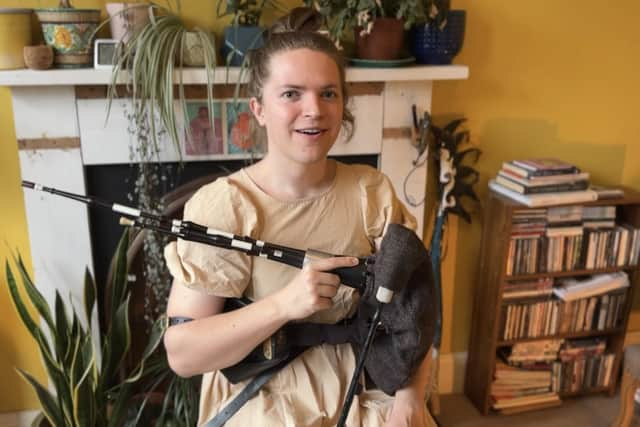The Scotsman Sessions #406: Malin Lewis
Piper, pipemaker and composer Malin Lewis chose their composition Hiraeth for their Scotsman Session. They explain the title of this eloquent air as a Welsh word expressing a profound yearning for a time or place to which you can’t return. For Lewis it’s the little island of Eilean Shona on Loch Moidart where they spent part of their childhood, but also, “in a wider sense, a longing for a political world in which everyone can feel safe and loved”.
Hiraeth is the opening track on their newly released debut album Halocline – another title replete with significance for Lewis who describes a halocline as a visible layer of water that can form between saltwater and freshwater. That sense of “betweenness” symbolises their own existence as a trans person.
Advertisement
Hide AdAdvertisement
Hide AdAs they state in the album’s sleeve notes, their music and gender have always been intrinsically linked, right from difficult times during childhood, growing up in Moidart and Skye, when learning pipes and fiddle became an essential escape. “I felt something was missing when I was younger. I never felt that I fitted in, and music became my way of expressing myself. I threw myself into it and it became a bit of a solace.”


The richly layered music of Halocline conveys, therefore, a jubilant sense of breakout, as in the reel titled simply Trans, as well as moments of reflection, as in the plangent air A Clearing. As well as playing pipes, fiddle and whistle, they’re accompanied on the album by numerous musicians including Luc McNally on bouzouki and guitar, Cammy Maxwell on synthesiser and double bass and saxophonist Mathew Herd.
These particular smallpipes are a major element in Lewis’s music, using as they do a unique, two-octave Lindsay System chanter. Lewis was already making pipes in their mid-teens: “I was sort of obsessed with how the sound was made – how pieces of vibrating reed could create those noises. At the same time I was learning the fiddle and playing in sessions, but I had this feeling about the pipes sort of being limited, with just nine notes.”
Lewis studied at the Royal Conservatoire of Scotland, going on to the Sibelius Academy in Helsinki, and it was on their first visit to the RCS that they had a chance to try out the Lindsay System, a 3D-printed chanter. “I’d heard about Donald’s chanter and it sounded too good to be true, but when I went down for my audition at the RCS I met up with him and he let me try it out. I totally fell in love with this instrument and asked if he’d be happy for me to make a version in wood. Donald’s such a generous guy he agreed and I spent the next few months making the wooden version, which took a wee bit of re-inventing.”
The result can be heard to potent effect throughout Halocline and also live, when Lewis makes a Tradfest appearance at Edinburgh’s Traverse theatre on 8 May, with fiddler Sally Simpson and guitarist Ali Hutton.